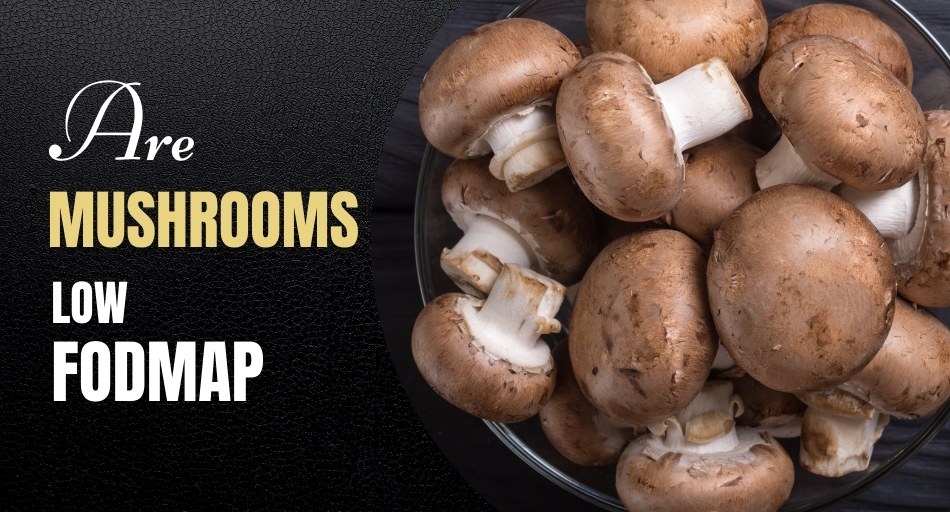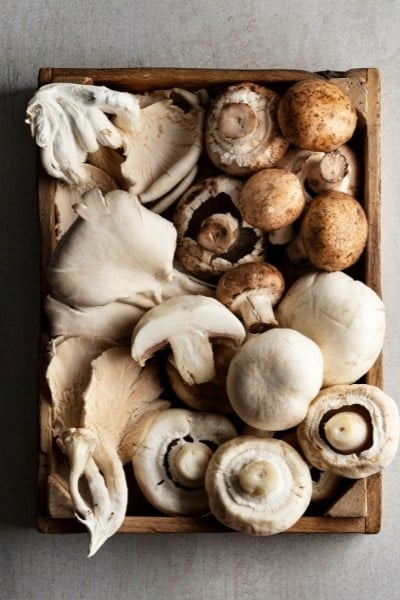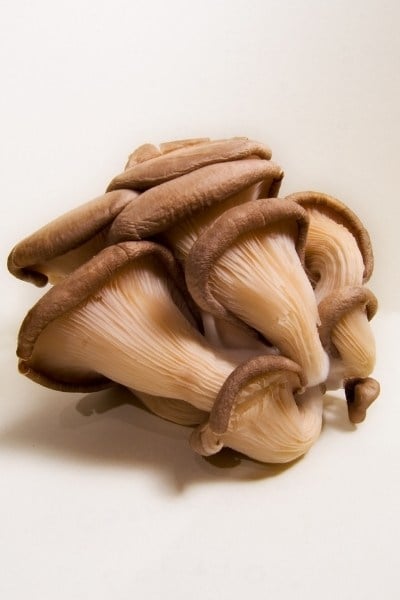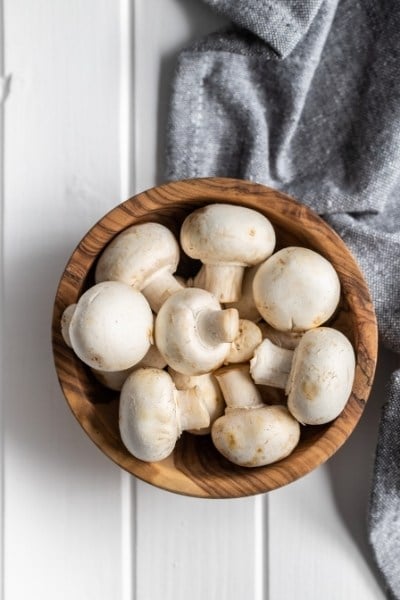Following a low FODMAP diet can be hard, especially if you’re just starting out. There are many foods out there that contain high amounts of these indigestible carbs. So, figuring out which ones are safe and which aren’t can be tough.

For example, most calories in mushrooms come from carbohydrates. So, this can mean that they’re high in FODMAPs. But is that true for all types of mushrooms?
Are they suitable for a low FODMAP diet or not so much?
Table of Contents
Are mushrooms low FODMAP?
Most varieties of fresh mushrooms are high in FODMAPs, so they should be either limited or avoided altogether on a low FODMAP diet. This is because eating them can trigger a lot of unpleasant IBS symptoms.
On the bright side, mushrooms are very nutritious and can contribute to good health. They also provide you with important nutrients like riboflavin, niacin, pantothenic acid, copper, and potassium.
They’re also high in antioxidants, so eating them can reduce your risk of various chronic conditions.

How high in FODMAPs are mushrooms?
Most types of mushrooms, especially oyster mushrooms, are very high in FODMAPs, even in small servings.
Because of that, experts often advise against eating this kind of mushrooms on a low FODMAP diet.
This is especially true for those who have a severe case of IBS or another digestive system condition.
Luckily, not everyone reacts to foods the same way. So, some people might be OK with eating small amounts of oyster mushrooms and other kinds.
But always start with small quantities to check how your digestive system reacts.
Are mushrooms good for you?
Most calories in mushrooms come from carbs, but this isn’t necessarily a bad thing. For example, one cup of canned white mushrooms contains 3.7 g of fiber, which equals 15% of your daily recommended need for this nutrient.
The fiber in mushrooms contributes to the feeling of fullness and satiety after eating. Because of that, eating mushrooms can help you lose weight or maintain a healthy weight.

In addition, the fiber in mushrooms, called beta-glucan, is a soluble fiber that improves cholesterol levels and boosts heart health. It also regulates blood sugar levels, lowering your risk of type 2 diabetes.
So, eating mushrooms for their fiber content is beneficial for your health.
Mushrooms are also rich in copper, a mineral crucial for the formation of hemoglobin.
Together with iron, copper helps maintain healthy bones, blood vessels and nerves, and immune function.
Because of that, getting enough copper from your diet can prevent cardiovascular issues as well as osteoporosis.
All mushroom types are an excellent source of pantothenic acid. Also known as vitamin B5, this micronutrient is one of the most important vitamins for your health.
It’s vital for making blood cells, and it also aids in converting the food you consume into energy.
What’s more, pantothenic acid is often used in skin supplements, as it helps maintain healthy and glowing skin.
Additionally, mushrooms are rich in powerful plant compounds and antioxidants. These substances help flush free radicals and toxins out of your body, preventing oxidative damage to your cells.
Thanks to that, you’re at a lower risk of various chronic conditions, including heart disease, diabetes, and even cancer.

All mushrooms provide you with a lot of niacin. Also known as vitamin B3, niacin improves blood fat levels, boosts brain function, and reduces blood pressure. It’s also important during pregnancy, as it reduces the risk of birth defects.
Plus, every type of mushroom is also rich in potassium, a mineral that helps offset the negative effects of sodium on your blood pressure.
While sodium is an important mineral, getting too much of it can raise your blood pressure and increase your risk of heart attacks and strokes. Potassium helps prevent that by stabilizing your blood pressure.
Potassium is also crucial for proper muscle and nerve function as well as regular heart rhythm.
So, eating a lot of potassium-rich foods is important for your health.
Can you eat mushrooms on a low FODMAP diet?
Generally, most mushrooms, especially the fresh kind, are high in FODMAPs. So, it’s best to avoid them, particularly if your digestive system is very sensitive to this type of indigestible carbohydrates.
On the other hand, canned mushrooms are lower in FODMAPs, as the excess leaks into the brine. So, make sure to consume drained mushrooms and avoid ingesting the brine.
Plus, some types of mushrooms like shiitake can be consumed on a low FODMAP diet in moderation.

But always introduce new foods carefully if you suffer from digestive system problems.
What type of mushrooms is safe for a low FODMAP diet?
There are many types of mushrooms, and some of them can be consumed on a low FODMAP diet.
For example, black fungi mushrooms – which are often used in soups and sauces – are considered safe for a low FODMAP diet. But you have to consume one cup at most in a single serving.
Shiitake mushrooms can be safe, depending on how severe your IBS symptoms are. A safe serving is considered to be four mushrooms. But make sure to start small to see how your digestive system is reacting.
Canned champignon mushrooms can be safe if you consume servings of ½ cup. This is because when mushrooms are canned, the excess of FODMAPs leaks into the brine, lowering the content of the indigestible carbs.
Oyster mushrooms, on the other hand, should be avoided, as they’re very high in FODMAPs.
Even in small quantities, these mushrooms can cause indigestion and other IBS-related symptoms.
Conclusion
Most fresh mushrooms are very high in FODMAPs, so they should be avoided or at least limited on a low FODMAP diet.
On the other hand, some varieties – especially the canned ones – are lower in FODMAPs, thus suitable for an IBS-friendly diet.
For those who can tolerate some mushrooms, eating them can help load up on important nutrients and antioxidants that contribute to good health and prevent disease.
So, adding some mushrooms to your diet can be beneficial for your overall health.
Sources: Nutrition Data, National Library of Medicine, and PMC
